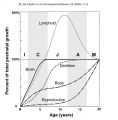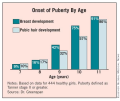One of our staff members is contributing considerably to a News Archiving service at Mu. Any well educated (Masters, PhD or above) users who wish to make comments on news sites, please contact Jim Burton directly rather than using this list, and we can work on maximising view count.
Debate Guide: Teen brain: Difference between revisions
The Admins (talk | contribs) No edit summary |
The Admins (talk | contribs) No edit summary |
||
| Line 1: | Line 1: | ||
__NOTOC__The brains of teenagers are described as inferior and underdeveloped, leading some laymen to conclude that western '''"teen turmoil"''' and allegedly '''"bad decision making"''' are innate and unavoidable. | __NOTOC__The brains of teenagers are described as inferior and underdeveloped, leading some laymen to conclude that western '''"teen turmoil"''' and allegedly '''"bad decision making"''' are innate and unavoidable. | ||
<blockquote><font color="green">'''''With scientists discovering that the brain does not stop developing until 25, we know that minors cannot give consent to sex, so why should we change the law?'''''</font></blockquote> | <blockquote><font color="green">'''''With scientists discovering that the brain does not stop developing until 25, we know that minors cannot give [[consent]] to sex, so why should we change the law?'''''</font></blockquote> | ||
The argument is based on outdated science and a series of false assumptions. [[Research: Cognitive ability|Our research article on cognitive ability]] has many sources to combine with the following rebutted myths: | The argument is based on outdated science and a series of false assumptions. [[Research: Cognitive ability|Our research article on cognitive ability]] has many sources to combine with the following rebutted myths: | ||
| Line 20: | Line 20: | ||
*That in its current form, the '''[[Debate Guide: Problems with the Age of Consent|age of consent]] is realistic and viable''' as a legal construct. | *That in its current form, the '''[[Debate Guide: Problems with the Age of Consent|age of consent]] is realistic and viable''' as a legal construct. | ||
We could for the proponent's benefit, then go on to extend the theory to other groups who tend to be less mentally capable. For example, racial groups exhibiting low IQs and low grades, the mentally ill, poor, elderly or otherwise vulnerable could all be given "protections" because of their "social status" and/or "inborn inferiorities" that might include "impulsive nature". And since "brain development does not end until 25", why not | We could for the proponent's benefit, then go on to extend the theory to other groups who tend to be less mentally capable. For example, racial groups exhibiting low IQs and low grades, the mentally ill, poor, elderly or otherwise vulnerable could all be given "protections" because of their "social status" and/or "inborn inferiorities" that might include "impulsive nature". And since "brain development does not end until 25", why not equalize the [[Age of Consent]] with such a scientifically-approved magical age, or go even higher since operational intelligence depends on learning facts; i.e. parameters of reference? | ||
In summary, these arguments are simply inferred from what is an already compromised body of "teen brain" literature and associated media-scares, designed to re-affirm contemporary anti-youth prejudice. The conclusions are based upon a logical leap from physiological (brain development) to cognitive, in that proponents fail to point out how exactly structure impairs ability. Then another logical leap is made from this half-baked cognitive argument to possible [[Victimology|victimological]], criminal and legislative implications. | In summary, these arguments are simply inferred from what is an already compromised body of "teen brain" literature and associated media-scares, designed to re-affirm contemporary anti-youth prejudice. The conclusions are based upon a logical leap from physiological (brain development) to cognitive, in that proponents fail to point out how exactly structure impairs ability. Then another logical leap is made from this half-baked cognitive argument to possible [[Victimology|victimological]], criminal and legislative implications. | ||
Revision as of 14:41, 15 March 2023
The brains of teenagers are described as inferior and underdeveloped, leading some laymen to conclude that western "teen turmoil" and allegedly "bad decision making" are innate and unavoidable.
With scientists discovering that the brain does not stop developing until 25, we know that minors cannot give consent to sex, so why should we change the law?
The argument is based on outdated science and a series of false assumptions. Our research article on cognitive ability has many sources to combine with the following rebutted myths:
- That brain development stops at 18 or 25, and is not already declining in some key areas.
- This is refuted by authors such as Epstein, in the article above.
- The developmental fallacy
- I.e. the belief that the neurology of minors at earlier points in their development is necessarily "inferior" or "less adapted" to tasks the minor is physically/biologically capable of. In the form of "recapitulation" theory, this is an outdated mis-application of Darwin.
- The above, as manifested in value-judgments.
- Giedd's and Romer's[1] studies, for example, refer to impulsiveness. From that, some unscrupulous individuals in the media have falsely concluded that teenagers are stupid, naturally reckless and need to be controlled or "protected". These are value-judgments. How one interprets the will (or ability) to take risks depends on ones own sensibilities and cultural norms. It is unsurprising then, that most interpretations of the teen brain steer clear of possible adaptive functions or Darwinian explanations and instead focus on pathology and poor control.
- That sex is something highly complex and hard to understand.
- For example, if there were no taboo, how easy would it be for mentally inferior people to practise safe sex? At its most basic level, enjoying pleasurable sensations is an incredibly simple, instinctual thing.
- That in its current form, the age of consent is realistic and viable as a legal construct.
We could for the proponent's benefit, then go on to extend the theory to other groups who tend to be less mentally capable. For example, racial groups exhibiting low IQs and low grades, the mentally ill, poor, elderly or otherwise vulnerable could all be given "protections" because of their "social status" and/or "inborn inferiorities" that might include "impulsive nature". And since "brain development does not end until 25", why not equalize the Age of Consent with such a scientifically-approved magical age, or go even higher since operational intelligence depends on learning facts; i.e. parameters of reference?
In summary, these arguments are simply inferred from what is an already compromised body of "teen brain" literature and associated media-scares, designed to re-affirm contemporary anti-youth prejudice. The conclusions are based upon a logical leap from physiological (brain development) to cognitive, in that proponents fail to point out how exactly structure impairs ability. Then another logical leap is made from this half-baked cognitive argument to possible victimological, criminal and legislative implications.
Examples of teen excellence
In Robert Epstein's article linked below, he refers to "long-standing studies of intelligence, perceptual abilities and memory function [showing] that teens are in many instances far superior to adults. Visual acuity, for example, peaks around the time of puberty. “Incidental memory”—the kind of memory that occurs automatically, without any mnemonic effort, peaks at about age 12 and declines through life. [...] In the 1940s pioneering intelligence researchers J. C. Raven and David Wechsler, relying on radically different kinds of intelligence tests, each showed that raw scores on intelligence tests peak between ages 13 and 15 and decline after that throughout life. [...] And whereas brain size is not necessarily a good indication of processing ability, it is notable that recent scanning data collected by Eric Courchesne and his colleagues at the University of California, San Diego, show that brain volume peaks at about age 14."
Fallacies and cognitive distortions covered
- Non sequitur fallacy: Age-correlated differences in brain development, and even failure in emotionally laden judgment challenges do not imply inferiority, inability or lack of consent. In fact, they may relate to adaptive traits, such as reproductive fitness in teenage boys.
- Cognitive distortion: Disqualifying the positive, Magnification.
Excerpt Graphic Library
Although the research section goes into a lot more detail, the EGL on Competences and Development has some relevant information. Just right click/save and reproduce by uploading in short-form media to bypass character limits.
-
Basic brain aging primer
-
Teen Brain research summary
-
Age chauvinism
-
BJ Casey
-
Joseph Bronski
-
Full Brain Size and adult-like competences in early childhood
-
Development of reasoning ability in early childhood (Moshman, 2005)
-
Early development of brain - Del Giudice
-
White and Gray Matter levels - Del Giudice (2017)
-
Bethlehem et al, 2022, brain volumes and matter levels by age
-
Giedd 1999 brain matter curves by age
-
Mills et al: Adolescent brains indistinguishable from adult. Variance in gray matter between individuals is far greater than any changes over time.
-
John Raven - Intelligence hits a peak in the mid teens, then plateaus and declines (the decline may have been at least in part due to poorer education in the interwar period).
-
John Raven - Intelligence hits a peak in the mid teens, then plateaus (note improvement in scores obtained in the 1970s)
-
Moshman on common fallacies of teen brain development
-
Moshman continued
-
Moshman continued
-
Laurence Steinberg (2008)
-
Epstein reviewed, plus other references - raw intelligence peak 13-15 y/o
-
2020 meta-analysis on the age of Thelarche (breast budding in girls - start of puberty). Similar for first period.
-
Conclusions of the aforementioned 2020 meta-analysis
-
Physical development - Tanner stages reached considerably earlier than commonly supposed
-
Physical development - Ages of pubertal development lower than commonly stated
-
Girls developing sexual features almost completely by 11
External links
- The Myth of the Teen Brain in Scientific American - Robert Epstein.
- Alcohol rots your brain and other lies the government tells you, an article debunking teen-brain/neo-prohibitionist propaganda using the example of alcohol.


















